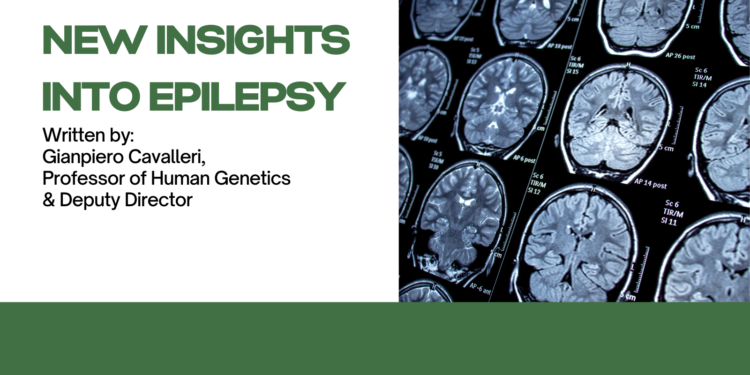Professor Gianpiero Cavalleri, Professor of Human Genetics at RCSI School of Pharmacy and Biomolecular Science and Deputy Director of the SFI FutureNeuro Research Centre
The largest genetic study of its kind, coordinated by the International League Against Epilepsy including scientists from FutureNeuro at RCSI University of Medicine and Health Sciences, has discovered specific changes in our DNA that increase the risk of developing epilepsy.
“This is a major milestone for the ILAE Consortium on Complex Epilepsies, demonstrating what can be achieved when scientists openly collaborate and share data from across the world. The outputs are wide-reaching and applicable to epilepsy patients globally”
The research, published in Nature Genetics, greatly advances our knowledge of why epilepsy develops and may inform the development of new treatments for the condition.
Epilepsy, a common brain disorder of which there are many different types, is known to have genetic components and sometimes runs in families. In this new study, researchers compared the DNA from diverse groups of almost 30,000 people with epilepsy to the DNA of 52,500 people without epilepsy. The differences highlighted areas of our DNA that might be involved in the development of the disorder.
The researchers identified 26 distinct areas in our DNA that appear to be linked to epilepsy. This included 19 that are specific to a particular form of epilepsy called Genetic Generalised Epilepsy (GGE). They were also able to point to 29 genes that are probably contributing to epilepsy within these DNA regions.
The scientists found that the genetic picture was quite different when comparing distinct types of epilepsy – in particular, when ‘focal’ and ‘generalised’ epilepsies were compared. The results also suggested that proteins that carry electrical impulse across the gaps between neurons in our brain make up some of the risk for generalised forms of epilepsy.
Quality of life
“Gaining a better understanding of the genetic underpinnings of epilepsy is key to developing new therapeutic options, and consequently a better quality of life for the over 50 million people globally living with epilepsy,” said Professor Gianpiero Cavalleri, Professor of Human Genetics at RCSI School of Pharmacy and Biomolecular Science and Deputy Director of the Opens in new windowSFI FutureNeuro Research Centre.
“The discoveries we report on here could only be achieved through international collaboration, on a global scale. We are proud of how the global community of scientists working to better understand the genetics of the epilepsies have pooled resources and collaborated effectively, for the benefit of people impacted by the condition.”
The researchers also showed that many of the current medications for epilepsy work by targeting the same epilepsy risk genes that were highlighted in this study. However, based on their data, the researchers were able to propose some potentially effective alternative drugs. These will need to be clinically tested for use in epilepsy as they are normally used for other conditions, but they are known to target some of the other epilepsy risk genes uncovered.
“This identification of epilepsy associated genetic changes will allow us to improve diagnosis and classification of different epilepsy subtypes. This in turn will guide clinicians in selecting the most beneficial treatment strategies, minimising seizures,” said Professor Colin Doherty, Consultant Neurologist at St James’s Hospital, co-author and clinical investigator at the SFI FutureNeuro Centre.
Unprecedented Collaboration
Over 150 researchers based across Europe, Australia, Asia, South America and North America carried out the research. They worked together as part of the International League Against Epilepsy (ILAE) Consortium on Complex Epilepsies. The ILAE Consortium was formed by researchers in 2010, recognising that the complexity of genetic and environmental factors underlying epilepsy would require research across massive datasets, and therefore unprecedented collaboration on an international scale.
“Undertaking such a comprehensive study is a remarkable achievement that RCSI and FutureNeuro are proud to have played a leading role in. The challenge now is to translate the findings of this research to improve the lives of people with epilepsy,” concluded Professor Cavalleri.
“With this study, we have bookmarked parts of our genome that should be the major focus of future epilepsy research. It will form the basis for further work looking at the molecular pathways involved in seizure generation, neuronal dysfunction and altered brain activity,” said Professor Samuel Berkovic, University of Melbourne.
“This is a major milestone for the ILAE Consortium on Complex Epilepsies, demonstrating what can be achieved when scientists openly collaborate and share data from across the world. The outputs are wide-reaching and applicable to epilepsy patients globally,” said Professor Helen Cross, President of the International League Against Epilepsy.
Science Foundation Ireland (SFI) supported the work through its funding of the FutureNeuro Research Centre.








